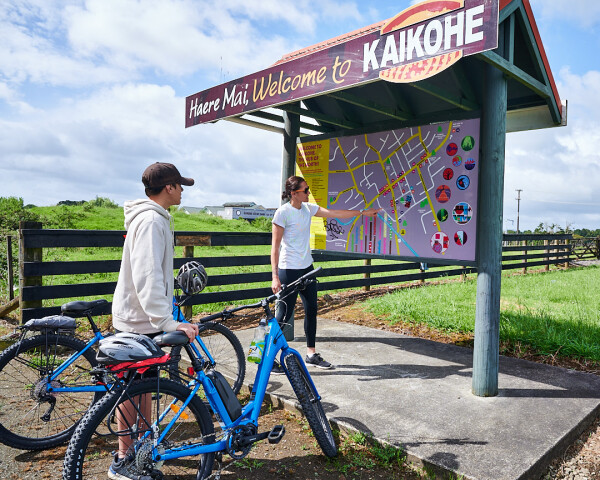Local initiatives promoting access and connections
Herenga ā Nuku is collaborating with local governments, tangata whenua, and community groups to enhance public access and trail strategies across New Zealand. These efforts aim to connect people within regions and promote wellbeing. Our goal is a more interconnected and recreationally vibrant landscape.
In the past year, Herenga ā Nuku worked on four regional strategies to extend access, recreation, and tourism opportunities.
Among the projects is the Tapuwae Tairāwhiti initiative. Unfortunately, development on this regional trails strategy paused during 2023 due to local government efforts redirected toward cyclone recovery. However, Gisborne District Council and Herenga ā Nuku are working to reinvigorate the project. In the meantime, the Tairāwhiti Adventure Trust stepped up to champion community trail aspirations. Locals have enthusiastically supported its recent projects, including a new skate park and pump track. Our regional field advisor is helping investigate a trail along an unformed legal road in the Okitu–Waimatā area.
Another project in the Tairāwhiti region, Te Ara Tipuna, is making headway despite the challenges posed by extreme weather events. This remarkable vision for a 500km trail, which will stretch from Tūranga-nui-a-Kiwa (Gisborne) to Ōpōtiki, seeks to connect 22 communities and 64 marae along the coast. Herenga ā Nuku is providing advice on public access issues, facilitating networking opportunities, and liaising with stakeholders, including Waka Kotahi. The project managers have lodged a global resource consent application with Gisborne District, Ōpōtiki and Bay of Plenty Regional Councils, marking a significant step forward.
The Pūhoi to Mangawhai Trails project is a joint effort between Herenga ā Nuku, Auckland Council and Matakana Coast Trail Trust. Following its success—and with the initial funding for the Pūhoi to Mangawhai project nearly finished—the two parties have signed a new joint Memorandum of Understanding to outline financial contributions for the project's next phase. The program manager role has expanded to include the Franklin area, highlighting our commitment to developing shovel-ready construction projects that benefit local communities.
The Franklin-North Waikato Trails initiative garnered positive feedback during its initial public consultation. In particular, a proposal for a targeted rate to support an expanded path program connecting the townships of Franklin received strong community support. The project manager is working with mana whenua to ensure inclusive path development priorities. Auckland Council has officially approved the Trails Targeted Rate for Franklin Local Board. Work started this July on the first tranche of a 10-year programme for new trails, footpaths and pedestrian crossings across the southern portion of the Auckland region. One trail connection will extend the reach of the Waiuku Trails network southwards from the town, in alignment with the Awaroa Trail that connects downstream to the Waikato River. Another trail connection aims to create new public access alongside the Glenbrook Vintage Railway.
A new partnership in Northland marks a significant development in trail access. Herenga ā Nuku has signed a memorandum of understanding with the Whangarei District Council and Bike Northland to implement the Regional Walking and Cycling Project. With Amanda Bennett at the helm, the project aims to position Northland as a world-class coastal walking and cycling destination. Multiple consultation hui have attracted diverse groups and people, which highlights the community's support and commitment to enhancing access across Te Taitokerau.

Photo credit: Pou Herenga Tai Twin Coast Cycle Trail
During 2023-2024 Herenga ā Nuku championed regional public access projects in collaboration with local councils, mana whenua, community groups, and funding partners. These regional strategies enhance recreational opportunities and foster economic and social wellbeing by developing long-term public access and trail strategies.

